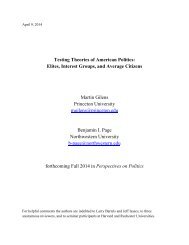ABUSE OF STRUCTURED FINANCIAL PRODUCTS- Misusing Basket Options to Avoid Taxes and Leverage Limits MAJORITY AND MINORITY STAFF REPORT
ABUSE OF STRUCTURED FINANCIAL PRODUCTS- Misusing Basket Options to Avoid Taxes and Leverage Limits MAJORITY AND MINORITY STAFF REPORT
ABUSE OF STRUCTURED FINANCIAL PRODUCTS- Misusing Basket Options to Avoid Taxes and Leverage Limits MAJORITY AND MINORITY STAFF REPORT
You also want an ePaper? Increase the reach of your titles
YUMPU automatically turns print PDFs into web optimized ePapers that Google loves.
17<br />
managed account which, in the case of high volume trading, can be substantial. In addition, the<br />
option seller can protect against any financial loss by hedging the option through the managed<br />
account <strong>and</strong> using the profits from the transactions in that account <strong>to</strong> cover any gains owed <strong>to</strong> the<br />
option buyer.<br />
Potential Tax, <strong>Leverage</strong>, <strong>and</strong> Transparency Abuses. <strong>Basket</strong> options are vulnerable <strong>to</strong><br />
the same tax, leverage, <strong>and</strong> transparency abuses identified above for derivatives generally. Of<br />
particular concern in the Subcommittee’s investigation is abuse of basket options <strong>to</strong> avoid tax.<br />
Option buyers have used the basket option structure <strong>to</strong> characterize short-term trading profits<br />
from the daily trading activity in the managed account as long-term capital gains for tax<br />
purposes. Option buyers have claimed that those profits were entitled <strong>to</strong> long-term capital gains<br />
treatment, because the option itself was held open for more than one year <strong>and</strong> thereby lowered<br />
the tax rate an inves<strong>to</strong>r had <strong>to</strong> pay on the gains paid out upon the exercise of the option. Option<br />
buyers have also claimed that they were not required <strong>to</strong> recognize any taxable gain from<br />
dividends paid on securities in the managed account until the option is exercised, despite the fact<br />
that the option buyer was credited with the gains from those dividends prior <strong>to</strong> any exercise of<br />
the option. In addition <strong>to</strong> those tax abuses, basket options can be used <strong>to</strong> circumvent the leverage<br />
limits in Regulation T <strong>and</strong> the reporting requirements in Schedule 13 D, as indicated earlier.<br />
B. Overview of Tax Principles<br />
To underst<strong>and</strong> the tax issues raised by basket options, it is useful <strong>to</strong> review key tax<br />
principles involving the taxation of capital gains <strong>and</strong> s<strong>to</strong>ck dividends; an existing tax code<br />
section, Section 1260, that sought <strong>to</strong> s<strong>to</strong>p the use of abusive derivatives, including options; <strong>and</strong><br />
the judicial doctrine warning taxpayers against elevating form over substance <strong>to</strong> avoid taxation.<br />
Also relevant is a 2010 IRS advisory memor<strong>and</strong>um determining that basket option arrangements<br />
did not entitle the option holders <strong>to</strong> treat their short-term trading profits as long-term capital<br />
gains.<br />
(1) Short <strong>and</strong> Long-Term Capital Gains Tax Treatment<br />
Because basket options involve the trading of securities, one key tax issue involves the<br />
taxation of capital gains, <strong>and</strong> whether those gains should be taxed at the short or long-term<br />
rate. A related issue is when the gains are realized.<br />
The profit realized from the sale of a capital asset is known as a capital gain. 47 Capital<br />
assets include s<strong>to</strong>cks, options, bonds, precious metals, <strong>and</strong> real property held for investment. 48<br />
When such an asset is sold, the difference between the amount paid for the asset <strong>and</strong> the amount<br />
for which it is sold is a capital gain. 49 When an asset is owned by a taxpayer for one year or<br />
less <strong>and</strong> sold, the gain is considered a “short-term” capital gain, <strong>and</strong> when the asset is held for<br />
more than a year at the time of sale, the gain is classified as a “long-term” capital gain. 50<br />
47 2/27/2014 “Topic 409-Capital Gains <strong>and</strong> Losses,” prepared by IRS, http://www.irs.gov/tax<strong>to</strong>pics/tc409.html.<br />
48 Id.<br />
49 Id.<br />
50 Id.







